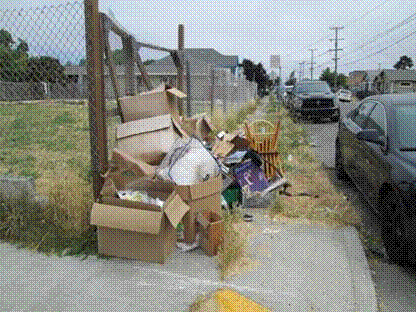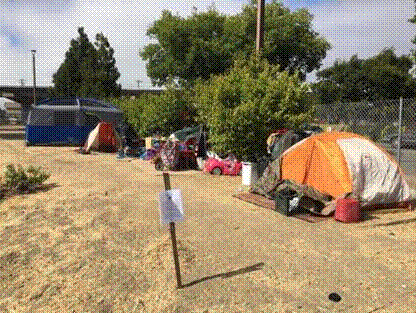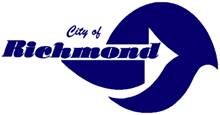|
We are offering some major initiatives to try to address Richmond’s homeless population as well as dumping and blight.


You may have read about The Mayor's 2018 Homeless Challenge, July 28, 2018, which was featured last night on KRON4 (https://www.kron4.com/news/bay-area/richmond-mayor-asks-big-companies-to-fund-city-sanctioned-homeless-camp/1343523658)/
In addition, we are proposing a vacant property tax similar to that placed on the ballot by the Oakland City Council earlier this week. The City Council will have an opportunity to place this on the November ballot at the August 7 City Council meeting. The measure, if passed, could raise over $5 million for homeless services and blight abatement. Following is the Agenda Report.

DATE: August 7, 2018
TO: Members of the City Council
FROM: Mayor Tom Butt
SUBJECT: PLACING A SPECIAL TAX ON VACANT PROPERTIES ON THE NOVEMBER 6, 2018 BALLOT
STATEMENT OF THE ISSUE:
The mayor is seeking council approval to submit a ballot measure to the voters in the City of Richmond to adopt an ordinance authorizing a Special Parcel Tax on Vacant Properties. The ballot measure will be prepared for the November 6, 2018 general election and must be approved by a two-thirds majority vote of the qualified electors casting votes.
RECOMMENDED ACTION:
ADOPT a resolution submitting to the voters at the next general election to be held November 6, 2018, a measure to establish a Special Parcel Tax on Vacant Properties at the rate of $3,000 annually per vacant developed parcel and $6,000 annually per vacant undeveloped parcel, raising about $5.4 million annually for 20 years to fund homelessness services and housing, blight and dumping elimination, and specified programs.
FINANCIAL IMPACT:
There is a cost of under $100,000 to place this Measure on the November 6, 2018 ballot. If it passes successfully, it can generate an estimated $5.424 million annually in new revenue to the City. Funds provided by the tax may be used to recover the costs associated with preparation of the ordinance and related documents required to obtain voter approval.
DISCUSSION:
Homelessness and blight, including dumping, vegetation overgrowth and unoccupied buildings, are two pervasive and enduring issues in Richmond, both underfunded and under-addressed.
According to the Point in Time count of January 2018, there were 270 unsheltered individuals in Richmond, living in encampments under overpasses, in vacant lots, along freeways and railroad rights-of-way and along creeks. Contra Costa County Health Services CORE team logged 721 unique contact points with homeless individuals between January 2017 and April 2018[1].
Unregulated and un-serviced encampments come with significant problems for the occupants and the surrounding communities. Encampments are inadequate and unsafe for their unsheltered residents and can have negative impacts on community health and safety. Areas surrounding unmanaged encampments can experience increases in blight and criminal activities including drug abuse and petty theft. They also foster an image that the neighborhood is declining, which can affect property values and community pride.
Encampments are political flashpoints with a lack of clear solutions. Some neighbors and community members want them to go away. Others argue that compassion should prevail, and the City should provide services within managed encampments while allowing them to stay put. While neither position is wrong, it is imperative that the City actively seek creative and effective solutions to improve community health and safety by serving all residents of our city, sheltered or not.
Currently, there is no source of funding in Richmond to move homeless persons into housing, assuming it is even available. The average rent for a studio apartment in Richmond is $1,400 a month, or $16,800 per year. If we were to provide enough units to house those counted as unsheltered and those staying in emergency shelter beds in Richmond, we would need to provide housing to nearly 581[2] individuals. Currently, there are not enough available units, and the cost of providing rental assistance to each individual could cost up to $9.76 million per year.
Vacant properties are also a problem, negatively impacting the community by attracting crime, blight and illegal dumping. Properties that remain vacant undermine the safety and vitality of our neighborhoods, and take up space that could be used for housing and businesses, creating jobs and providing tax revenue.
Taxing the “unearned increment” is coming back in vogue among municipal policy makers and scholars of urban studies. If real property consists of both structures and land, and if the value of land is determined by locational amenities produced by a community and improvements to other properties in the same area, then a property owner who leaves his fully served urban land vacant derives a profit unrelated to his investment. Taxing this “unearned increment” would encourage owners of vacant land to develop their properties, or sell their parcels to those who would, thus increasing housing-stock, business activity and jobs while driving down rents.
The origins of the land-value tax movement in the U.S can be traced to Henry George and his famous 1879 book Progress and Poverty. George saw urban land speculation as a driver of urban inequality; by reducing the supply of buildings it raised rents for tenants and made home-ownership prohibitively expensive to most New Yorkers.
This proposed ordinance, prepared by the Mayor’s Office, is similar to one recently placed on the November 2018 General Election ballot by the Oakland City Council.
Staff estimates that there are between 980 and 1,180 vacant parcels in Richmond and 250 vacant structures, most of which are abandoned residences. Roughly 998 parcels are estimated to be subject to this tax, and the potential for tax revenue is as follows:
Property Type |
Annual Tax Rate |
Revenue |
Vacant Parcel |
$6,000 |
$4.86 million |
Vacant Building |
$3,000 |
$564,000 |
Total: |
|
$5,424,000 |
In addition to creating a dedicated funding source, by taxing vacant properties, this measure will help encourage people to put those properties back into use, thus, increasing the housing supply. Properties that are left vacant for extended periods of time can attract crime and cause blight, harming the surrounding neighborhood. Taxing vacant properties, therefore, is helpful on both ends of this problem. The tax itself will incentivize productive use of vacant properties, and the tax revenue will be used to address the homelessness crisis and sources of poverty as well as blight.
The proposed parcel tax on vacant property would apply to most vacant property throughout the city, including undeveloped private property, vacant commercial and industrial buildings, and vacant residential units. A property would be classified as vacant if it is in use less than 50 days during a calendar year. The property need not have a building or structure on it to be "in active use." For example, this proposed tax would not apply to properties that are used as gardens, or to host farmers' markets. The Measure would create an administrative process through which the owner of vacant property could apply for a hardship waiver to be exempted from the tax.
The following will be exempt from the tax imposed by this Ordinance:
1) An Owner who qualifies as very low-income, as the term "very low income" is defined
by the United States Department of Housing and Urban Development.
2) An Owner who can demonstrate that exceptional specific circumstances prevent the use or development of the property. By way of example only and without limiting the generality of the foregoing, exceptional specific circumstances that prevent the use or development of property include property damage by a recent natural disaster, an undeveloped parcel adjoining a developed residential parcel and used by the occupants as part of the yard, and property with physical conditions that prevent development. The details of this exemption shall be further defined by separate ordinance of the City Council.
3) An Owner of a property that is under active construction. To qualify for this exemption, an Owner must call for inspections of the construction with sufficient frequency to keep the building permit or permits active.
4) An Owner of property for which an active building permit application is being processed by the City.
5) An Owner of a parcel included in a substantially complete application for planning approvals that has not yet received approval. An Owner of a parcel for which a project with development entitlements have been approved but needing time for completion may apply for and receive an administrative two-year exemption.
6) An Owner of property for which at least 60 percent of the accessible dry land is actively used for Community Garden(s), Outdoor Agriculture, or Urban Agriculture.
The City Manager’s designee will establish the procedures for owners to apply for, and the City to grant, hardship exemptions; and the City Council may also establish other such hardship exemptions it determines to be appropriate.
The parcel tax will be adopted as a Special Tax, and if approved by 2/3 of the voters, would be collected by Contra Costa County through the property tax rolls, unless the Council chooses to adopt a different collection method. In addition, this Measure directs the Richmond Housing Advisory Commission to help direct the proper use of the funds, and publish an annual report regarding how and to what extent the City Council and Mayor have implemented this Ordinance.
Other cities, such as Washington, D.C., and Vancouver, Canada have implemented taxes on vacant properties. The Vancouver tax approved in 2016 places a $7,450 annual tax on vacant residential units[3] and the Washington, D.C. legislation in 2016 increased property taxes on vacant structures by 5% and 10% on blighted properties.[4]
The special parcel tax on vacant properties is designed to increase revenue for critically unfunded and underfunded programs and services that address homelessness, blight, public safety and shortage of affordable housing. Examples of such uses include, but are not limited to:
• Job training, apprenticeship, pre-apprenticeship, drug treatment, and job readiness assistance programs for homeless people or those at risk of becoming homeless.
• Assistance connecting homeless people or those at risk of becoming homeless with available services and resources, including assistance applying for housing or public benefit programs;
• Housing assistance, including the provision of temporary housing or move-in expenses, such as first-month's rent and a security deposit, and emergency rental assistance.
• Sanitation, bathroom, and cleaning services related to homeless encampments, and programs to supplement remedying and deterring blight and illegal dumping throughout the City.
• Incentive programs to encourage property owners to make space available for low income housing, including making funds available for physical improvements to enable a unit to be used for a voucher-based housing program.
• Relocation assistance funding for low-income households facing displacement.
• Financial assistance for the design, development, construction or operation of affordable housing units, including housing alternatives such as, without limitation, accessory dwelling units, tiny homes, and permanent supportive housing.
• Accessibility support to provide or maintain housing, and make needed improvements for accessibility, for seniors and persons with disabilities.
• Navigation centers to provide space for people to stay, along with on-site support services for the homeless. Funding may be used for both capital and operating costs related to navigation centers.
• Code enforcement and cleanup of blighted vacant properties, other blight elimination, and remedying illegal dumping, including legal action to address any of the foregoing as necessary.
In addition, the costs to administer and implement the tax would be covered.
The Mayor’s Office has prepared an ordinance to submit to the voters at the November 6, 2018 general election for approval. This resolution and the attached ordinance submits the following measure to the voters:
"Shall an Ordinance of the City of Richmond’s Municipal Code to establish a Special Parcel Tax on Vacant Properties at the rate of $3,000 annually per vacant developed parcel and $6,000 annually per vacant undeveloped parcel, raising about $5.4 million annually for 20 years to fund homelessness services and housing, blight and dumping elimination, and specified programs, be adopted?”
ATTACHMENTS:
Attachment 1 – Resolution Submitting to the Voters a Measure to Adopt a Special Parcel Tax on Vacant Properties
Attachment 2 - Notice of Election and Measure to be Voted on
Attachment 3 - Special Parcel Tax on Vacant Property Ordinance
[1] Source: CCHS CORE Outreach Contact Report
[2] Source: PIT count and CCHS data, 270 unsheltered and 311 emergency shelter beds in Richmond.
[3] Source: 11/21/2016 Time Magazine – Vancouver is Taxing Owners of Empty Homes
[4] Source: 11/01/2016 Washington City Paper – D.C. Tightens Regulations on Vacant Properties
|

